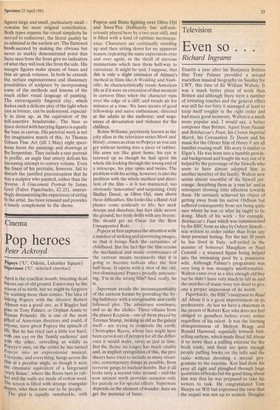Cinema
Pop heroes ,
Peter Ackroyd
Popeye (`U', Odeon, Leicegter Square) Superman ('U', selected cinemas) April is the cruellest month, breeding dead heroes out of old ground. Easter may be the season of re-birth, but we might be forgiven tor wanting more than comics. The 'idea of linking Popeye with the director Robert Altman was a good one, as if Biggles had gone to Tony Palmer, or Orphan Annie to Roman Polanski. He is one of the most gifted of American directors and could, if anyone, have given Popeye the spinach of life. But he has tried just a little too hard; With one eye on the 'family audience' and With the other, swivelling as wildly as Popeye's own, on the critics he has turned Popeye into an expressionist musical.
veryone, and everything, hangs across the film at a peculiar angle, as though it were the cinematic equivalent of a fairground crazy house', where the floors turn to rubber and the walls are made of cotton wool. The screen is filled with strange triangular Shapes, who then turn out to be people.
The plot is equally ramshackle, with Popeye and Bluto fighting over Olive Oyl and Swee'Pea (brilliantly but self-consciously played here by a two year old), and is filled with a kind of sublime inconsequence. Characters are continually standing up and then sitting down for no apparent reason, repeating the same expressions over and over again, in the thrall of nervous mannerisms which turn them half-way to caricature. It might be said, I suppose, that this is only a slight extension of Altman's method in films like A Wedding and Nashville; he characteristically treats American life as if it were an extension of that moment in cartoon films when the character runs over the edge of a cliff, and treads air for minutes at a time. We have scenes of good fellowship and naive enthusiasm, directed at the adults in the audience, and sequences of devastation and violence for the chicdren.
Robin Williams, previously known as the joky alien in the television series Mork and Mindy , comes as close to Popeye as you can get without turning into a piece of rubber. His arms are like giant hams, his eye is screwed up as though he had spent his whole life looking through the wrong end of a telescope, his pipe spins and twists. The problem with his acting, however, is also the problem with the whole method and direction of the film — it is too mannered, too obviously 'innovative' and surprising. Only Shelley Duval, as Olive Oyl, rises above these difficulties. She looks like a Band-Aid plaster come restlessly to life; her neck droops and dissolves, her feet slide across the ground, her body drifts with any breeze. She should get an Oscar for the Best Unsupported Role. Popeye at first captures the attention with a number of striking and convincing images, so that it brings sack the certainties of childhood. But the fact that the film retains the mechanical and manic contrivances of the cartoon means necessarily that it is going to become tedious after the first half-hour. It opens with a shot of the old, two-dimensional Popeye proudly announcing, 'I'm in the wrong film !' And, really, he is.
Superman avoids the inconsequentiality of the cartoon format by providing the flying bulldozer with a recognisable and easily followed plot. The adventure continues, and so do the clichés. Three villains from the planet Krypton — one of them played by Terence Stamp, looking as old as the galaxy itself — are trying to dominate the earth; Christopher Reeve, whose face might have been carved out of perspex for all the difference it would make, saves us just in time. But the theme no longer has much vitality and, in implicit recognition of this, the producers have tried to include as many vivacious, contemporary things as possible, from terrorist gangs to nuclear bombs. But it all looks tatty a second time around — and the now ancient myth provides occasion only for parody or for special effects. Superman depends on the element of wonder; here we get the material of farce.


































 Previous page
Previous page